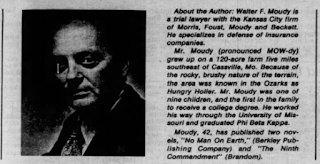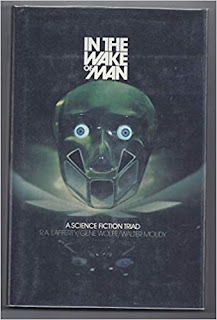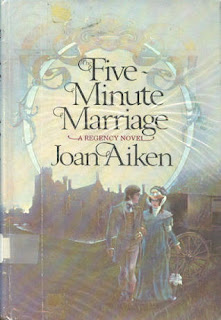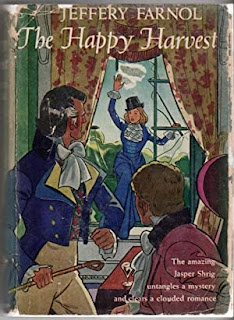The Complete(?) Works of Walter F. Moudy
a survey by Rich Horton
Walter Frank Moudy was born in Cassville, Missouri, a very rural town in the Ozarks of Southwestern Missouri, near the Arkansas border, in 1929, and died in Kansas City in 1973, not yet 44 (I believe in a car accident.) I asked for help in learning more about him, and Paul di Filippo and Dave Hook came through, with an obituary from the Kansas City Star, and with the news that he had published at least a couple more stories in that newspaper's Sunday supplement, the Star Magazine, in 1972. Other details from the obituary: Moudy was a lawyer (as I had expected, based on internal evidence from his stories) and he went to the University of Missouri. He had a wife and three children, heightening the tragedy of his early death.
(The Star's obituary mentioned three stories for their magazine, but that seems to have been an error. For the third story was not by Moudy. "The Silver Dolphin" appeared in the September 17, 1972 issue of the Star Magazine, and the table of contents advertised it as short fiction by Walter Moudy. But the story itself is bylined Robert W. Bailey, and the brief profile of the author stated that he was a student at Northwest Missouri State. Something clicked in my head, and I looked up Robin Wayne Bailey, a Kansas City SF and Fantasy writer, former President of SFWA. (And someone I've met personally, shared panels with, talked with at various conventions.) Robin went to Northwest Missouri State, and was there in the early '70s. And his legal first name is Robert. So I asked Robin if that was his story -- and it was, his first professional sale. (It is not SF.) I just thought that a delightful coincidence -- in looking up Walter Moudy's publications, I chanced across the first published story by a writer I know pesonally.)
Walter Moudy published an SF novel, No Man on Earth, in 1964, followed by three stories in Cele Lalli's magazines, Amazing and Fantastic, in 1965, and an erotic (rather tamely so) paperback, The Ninth Commandment (set, by the way, in Kansas City) in 1966. His only other SF stories were "The Peddler", one of the Star Magazine stories, and "The Search for Man", published two years after his death. The Star Magazine also published one non-SF piece, "Please Wrap Separately". One of his stories, "The Survivor", is well-remembered -- it was anthologized in Judith Merril's best of the year book, and has been reprinted several times since. (His byline alternated somewhat randomly between "Walter Moudy" and "Walter F. Moudy".) I should add that given my late discovery that he had published some stories in a Sunday supplement, it's possible that there are other Walter Moudy stories out there somewhere.
Moudy had some real talent as an SF writer, mostly centered on a powerful imagination. He wasn't a hard SF writer, for sure. And his characterization skills were thin. His prose was fine -- nothing special, but competent. (That said, his last few stories, from the '70s, were a bit more slickly written than his earlier work.) A couple of his stories remain worth reading, the novel is uneven as heck, but often interesting -- indeed all of his SF is at least OK. (I'd probably skip the sleaze novel.) Could he have had a more prominent career had he lived longer, and spent more time on it? It's hard to say, but it's too bad he didn't get the chance to try.
No Man on Earth (Berkley, 1964)
This is Moudy's only SF novel, and his first publication, from Berkley in 1964. There were two UK editions, a Whiting and Wheaton hardcover in 1966 and a Corgi paperback in 1967. Despite these three printings, the book is rather hard to find. It recently got some completely unexpected notice when the Pulitzer Prize winning novelist Geraldine Brooks cited it as her "Favorite Book no one has ever heard of" in a New York Times profile.
It is a curious and interesting if not exactly wholly successful novel. It is one of those novels that changes directions and focus multiple times. You get the sense of a writer with a lot of ideas he wanted to make sure made it into his book.
It opens in a rural setting, with a young woman pregnant with a child resulting from her rape by a rumored "manwitch". (For people of a certain age, it's hard to see the word "manwitch" and not think of a certain Sloppy Joe mix.) Once born, the child, named Thad, is clearly some sort of superman, even though he and his mother live in deep poverty in what we learn is a reservation of sorts, where a sample of pre-20th Century humans live in conditions resembling, perhaps, the Ozarks as of 1910 or so. The boy's differences attract the attention of the local teacher -- who is of course a representative of the future society that has maintained this reservation. He soon realizes he must escape, and so he does, despite the precautions taken to isolate the reservation. And he lands in Kansas City, while the government tries to track him down after getting a report from the teacher. Thad is interested, by now, in finding his father to take revenge on the rape of his mother, and also in learning all he can about everything -- science in particular. And after various mild adventures, Thad is suddenly making some remarkable inventions, and building a successful business. This becomes a great concern to the government, which has maintained peace partly, it seems, by suppressing innovation.
But Thad's success continues, and he is clever enough to avoid the government's attempts on him. Soon he is engaged in building a starship, having figured out that the "manwitch" who raped his mother must have been an alien. He falls in love with a government spy, who reciprocates his affections and abandons her spy position. The primary POV character throughout this part -- and indeed most of the novel -- is a government agent, Lloyd Coleman, who takes a liking to Thad, but who struggles with the idea that perhaps it is best that he kill him -- for the sake of the human race.
The upshot is that, after Thad's girlfriend is murdered, the government agrees to allow him to take his starship on a mission of exploration -- as long as he accepts Lloyd and two representatives of other polities -- a Russian woman and a Swedish man. So off they go into space, in search of Thad's father. There follow a few episodes -- almost in Star Trek mode -- as Thad and his crew visit various planets, having adventures such as being imprisoned by the local authorities and having to make a dramatic escape, or fetching up on a planet with very loose sexual morals and thus engaging in flings with the beautiful natives; eventually finding the major center of local galactic civilization, ever finding more and more evidence of Thad's father. The Swedish man and Russian woman, originally sworn enemies, naturally fall in love and decide to stay behind on one of the planets ...
I won't detail the ending. Of course it resolves in a return to Earth, after Thad has finally found his father. Thad decides on an appropriate "punishment" for that man -- only after Lloyd is finally able to work through his conflict about whether it is safe to allow Thad to live. And Thad faces his own destiny ...
This is not a great novel. There isn't a shred of scientific plausibility. The characters are cliches. The writing is competent but not exceptional. The sexual politics are laughable. The plot is a mess, structurally. But ... but ... my interest was maintained throughout. Moudy really had an intriguing imagination, and a clever way with the individual episodes. It's a fun if preoposterous read.
Short Stories:
"The Dreamer" (Fantastic, April 1965) 3500 words
This is a very slight story, sort of a science fictionalization of a certain sort of fairy tale. It concerns a young failed merchant with a snarky talking parrot, who decides to take a starship to another world where there might be a market for his products. His laziness means he will fail there as well, but he does have one thing of value -- his parrot. And the efforts of his parrot, plus the young man's fortuitous bumbling with respect to a certain princess, do end up making his fortune, and more importantly that of the parrot. It's a trivial piece, but pleasantly enough executed.
"I Think They Love Me" (Fantastic, May 1965) 2000 words
There's a certain cranky get off my lawn aspect to this also rather slight satire of Beatlemania and the general passion showed by fans towards pop groups in that era, as the narrator tells the tale of his time as a pop star, beginning with training in somewhat military fashion for how to survive the raving crowds. Predictable end, and the satire kind of misses the point, but, again, tolerably well-written.
"The Survivor" (Amazing, May 1965) 10,800 words
This could easily have appeared, with trivial changes, in a 2016 magazine. It concerns what we would now call a reality show: a staged war in which 100 soldiers for the Soviet Union and the United States battle for economic benefits. The winning side gets a lot of money from the losing side, and any surviving soldier (the battle is over when all the soldiers on one side are dead) gets his own benefits: financial, no doubt, but mainly personal: he is now immune from prosecution for any crime. The story follows one American soldier, Richard Starbuck, as he experiences the battle, and, through sheer luck, becomes the only survivor, and therefore the reason the US wins. The denouement is inevitable, and shocking, and only too believable. The telling is effective, particularly in its depiction of the "expert" commentary. It’s an excellent story. It wasn’t ignored -- Judith Merril picked it for her Best of the Year book -- and it’s still remembered --Paula Guran reprinted it as recently as 2014.
"The Peddler" (Kansas City Star Magazine, September 10, 1972)
This is an SF story, about a woman married to a successful man who seems maybe to be losing interest in her. Their house is automated -- '50s SF style automated house, or maybe Jetsons style. The husband leaves for work, warning her he'll be home late -- important meeting. Then a robot peddler shows up, with a special product -- a lie detector mesh to add to any chair in the house. And there's a free trial ... so she accepts the trial, and when her husband gets home late -- well, you can see what's going to happen, and that she'll keep the lie detector. A fairly trivial story, but professionally done.
"The Search for Man" (In the Wake of Man) 16500 words
"The Search for Man" concerns a child named David Zimmerman, a robot in the far future, with a brain based on a mix of the brain material saved from 12 humans. It seems that humans have died out, but the robots who served them saved the brains of 12 of the best and brightest humans, and since then have made their children (robots do wear out) with intelligence derived from those humans.
David grows up a particularly promising young man/robot, at first an eager adherent to the robot religion devoted to search for remnants of humans and human civilization. But as he grows older, he becomes disillusioned, and realizes that Man is truly dead -- and he becomes the Anti-Man, convinced that robots must throw off the influence of human history and make their own way. He lectures on this theme, until he meets a young woman who disputes his ideas -- she is the daughter of one of the robot religious leaders. David, against his will, is falling in love -- and he is drawn to meet the woman's father, who has a shocking revelation.
The upshot is that David and his lover head to Mars, where apparently a few humans tried to escape the catastrophe on Earth. And on Mars they find the remnants of those people, who live a horribly constricted life underground. David is able to offer them a return to their future Earth -- but the results of this will inevitably wholly change robot society. The resolution is curious -- inspiring in a way, but dark too, for if anything the Martian humans are more robotic than even the robots. But perhaps they have more room to change?
It's an intriguing and readable story, though also rather silly in places. Moudy, in general, seemed uninterested in scientific plausibility -- his stories and his novel could have almost the feel of 1930s SF. But the ideas behind them were solid and ambitious. He's an uneven writer, but his small oeuvre is worth reading.
Non-SF
The Ninth Commandment (Brandon House, 1966)
As far as I know, this was the only non science fiction book Moudy published. Brandon House was a major Los Angeles based publisher of what were called "sleaze paperbacks" (I apologize to the authors of those, a few of whom I know, who object that their books were not "sleazy" and were professional efforts, simply not publishable at that time by bigger publishers.) Milton Luros was the publisher. They did feature works by SF writers such as Philip Jose Farmer and Richard E. Geis.This book, to my mind, fits on the tamer side of the category. It does have several sex scenes, including at least one out and out rape (of a 13 year old girl by her 14 year old cousin), but the scenes are not terribly (if at all) titillating, nor very explicit; and, really, Walter Moudy's intent here seems fairly serious. He really does seem to be attempting to portray the sexual problems of a mid '60s couple in a frank manner -- though the view of, in particular, female sexuality seems profoundly off track.
The story centers on Norman Thurston, an up and coming Kansas City lawyer in his late 20s, and his wife Rita, a beautiful woman, something of a social climber, but (it seems) somewhat frigid (to use the term then common.) Their lives are disturbed by the return of Norman's older brother Jack, a gambler and rambler (to coin a phrase) who wrote a well-received Kerouacian novel but hasn't done much else with this life.
The setup and the title (the ninth commandment is "Thou shalt not covet thy brother's wife") make it clear that sooner or later Jack Thurston is going to have sex with his sister-in-law Rita, but the novel takes its time. We learn about the early, mostly unsatisfactory, sexual experiences of all three. Of Jack and Norman's upbringing in rural Caryton (which I suspect resembles Moudy's home of Cassville) with an abusive and very religious father, and very little money. Jack gets out as soon as he can and starts wandering, learning along the way that he can easily seduce women but can't stay with them. Norman uses his basketball ability to get to college and become a lawyer. Rita grows up in more established circumstances, her father a successful store owner, her mother part of KC society. But her mother is smothering, and her parents' marriage is all but sexless, and Rita's early experiences (the rape) don't help her either. Her mother clearly thinks Norman, despite his good job, is too low class for her daughter. Rita's efforts to establish herself in local society seem an attempt to both please, and escape, her mother, and to do something about her boring housewife life. (She has a degree from Stephens College in Columbia.)
Jack stays with them, gets into a relationship with an old girlfriend who has gotten divorced, but it goes nowhere. Jack and Rita talk a lot, but there's no hint of sex, until one weekend when Norman has a major trip to make which may make his career, but which means Rita can't go to the society party she coveted ... so she and Jack go out for dinner and dancing instead, and she gets drunk, and Jack takes advantage. Of course leading to an explosive conclusion when both her father and Norman eventually find out ...
I honestly think Moudy was trying for something mildly ambitous -- a portrait of a dying marriage between two basically decent but messed up people. But his characterization is clumsy and forced, and as I said his notions of female sexuality as portrayed here strike me as terribly off; and Rita really seems a cliche. And the sex scenes are dry squibs -- in a novel published by Brandon House I would have supposed the real payoff was supposed to be the porn part ... though as I haven't read any more of those perhaps it was all like this back then?
What made the best of Moudy's fiction work was mostly his imagination. And in this book, he really has no room to use it.
"Please Wrap Separately" (Kansas City Star Magazine, October 1, 1972)
This a brief lightly comic satrical piece about an engineering manager from Kansas City who has been promoted to the home office in New York. He has a pretty wife who went to Vassar, and a pretty mistress on the side. Their birthdays are coincidentally on the same day, so he buys them the same present (perfume), asking the clerk to wrap them separately. But when he gets to his mistress' apartment, there's someone else there ... so he keeps her present, and when he gets home he gives them both to his wife, forgetting the note to his mistress. But on the way in to his apartment he heard evidence of someone sneaking out ... And the story ends with he and his wife realizing what they've both been up to, and deciding they will live with it: it makes things simple for both of them. It's smoothly written, nicely done -- a minor work but not bad.
Here's the Kansas City Star's profile of Moudy, complete with photograph:










